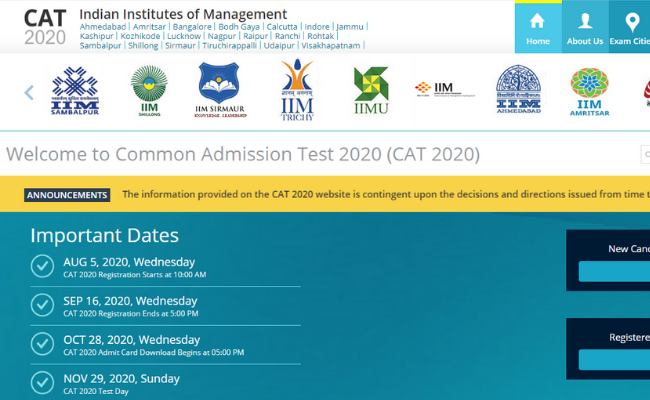With less than a fortnight to CAT 2020 , you must now revise what you had learned in the past few months. Fresh preparation makes little sense at the eleventh hour. But who can resist a Hail Mary?
The Common Admission Test (CAT) conducted by IIMs is probably one of the most competitive entrance tests you will take for your MBA admission.
The reduced time (120 minutes) this year could make the test even trickier. Most test-takers tend to panic and yield to pressure. But you can work smartly and cruise your way through the CAT. Use the next ten days wisely.
Revise concepts
You have learned the concepts in all the three sections – Verbal Ability and Reading Comprehension (VARC), Quantitative Ability (QA), and Data Interpretation and Logical Reasoning (DILR).
As you revisit the concepts section-wise, identify areas where you need practice. Look at how to overcome the errors in chapters where you could not score.
Verbal Ability and Reading Comprehension
The VARC section poses a problem for most test-takers, particularly Reading Comprehension. While some find the topics vague, others feel tricked by the options that follow the questions. Continue to read the newspaper and web-based articles.
Cover the more common topics in the CAT like economics, history, science, ecology, literature, psychology, and philosophy. The more you familiarize yourself with the topics, the more comfortable you will find solving passages.
Get familiar with the jargon in topics so that you comprehend the passages easily and do not confuse yourself between options.
This broad article reading also helps you in solving the para-based questions like para jumbles, sentence completion, sentence elimination, and summary questions.
Critical reasoning questions like finding inferences or assumptions can be time-consuming. Practice the questions to fine-tune your reasoning concepts.
Solve a passage or two besides two to three para-based and critical reasoning questions every day. When you solve passages, try to paraphrase the passage.
Summarising the passage helps in faster comprehension and easier spotting of answers. During the CAT, you will automatically summarize the passage mentally, which helps in better accuracy.
Accuracy is the key, even more than speed.
Quantitative Ability
You can ace the QA section if you are good at the basics. Proficiency in arithmetic, algebra, and geometry is crucial to solving the QA section. Maths skills are as important to cracking the QA section as problem-solving skills.
Identifying the direct questions and solving them first will give you the time to analyze the tricky questions.
Comprehending the question, analyzing the solution, eliminating incorrect answers, and identifying the correct option at break-neck speed will come in handy as you practise the problems in mocks. Only a calm and relaxed mindset can take you through the QA section smoothly.
Data Interpretation and Logical Reasoning
The DILR is one section that tests your analytical skills more than bookish knowledge. Practising questions is more crucial to DILR than VARC or QA.
You will gain much by scrutinizing previous years’ CAT papers and solving sectional mocks with a timer. The familiarity of question types with knowledge of expected answers is pivotal to getting through the DILR section.
You might encounter at least two sets in DI, one of which may be trickier than the other. Solve the questions in the easy set first. With the time gained, you can analyze the tricky set after solving the LR questions.
The CAT 100 percentile advice
Continue to solve both full-length and sectional mocks. The more the merrier. If you have revised and practised all the three sections regularly, you might end up in the 99 percentile club if not 100 percentile. Staying calm and getting rid of any anxiety is imperative to get through any test, and the CAT calls for your savoir-faire.
All the best!
Stay connected with fellow students on PaGaLGuY for CAT Exam 2020 Discussion
